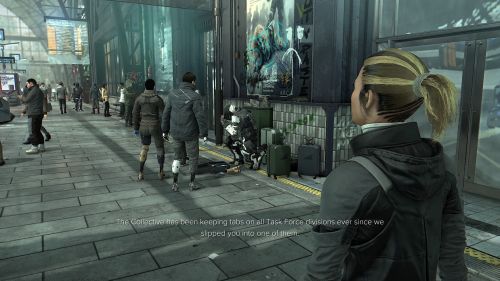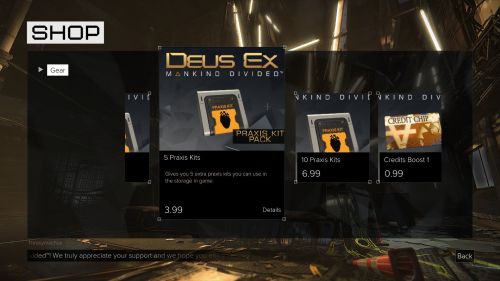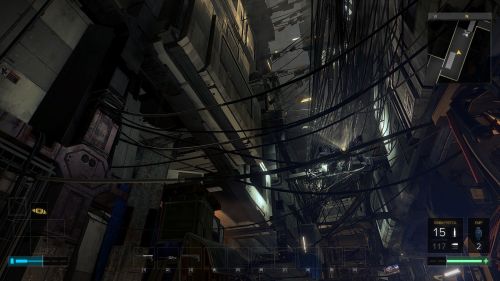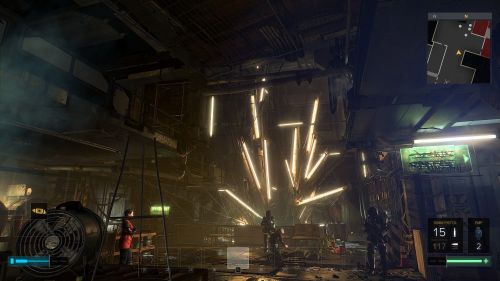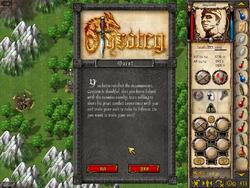RPG Codex Review: Deus Ex: Mankind Divided
RPG Codex Review: Deus Ex: Mankind Divided
Review - posted by Crooked Bee on Sun 18 September 2016, 15:07:42
Tags: Deus Ex: Mankind Divided; Eidos MontrealIon Storm's Deus Ex belongs to the Codex's all-time beloved classics, and even the 2011 Deus Ex: Human Revolution earned a place in our Top 75 RPG list. This year, Eidos Montreal released a sequel to Human Revolution, called Deus Ex: Mankind Divided, set two years after that game's events. Does it improve on or at least match the level of quality of its predecessor, or is it more of a mixed bag?
According to esteemed community member TNO, it is unfortunately the latter. Here are a few excerpts from his review:
These excerpts do not, however, do justice to everything that the review talks about, so be sure to read it in full: RPG Codex Review: Deus Ex: Mankind Divided
(Warning: the review contains some mild spoilers.)
According to esteemed community member TNO, it is unfortunately the latter. Here are a few excerpts from his review:
One of the dividends of increasing technology is the mission environments in Mankind Divided have generally gotten bigger, and so they more closely approach the near-perfection of the original Deus Ex. Pallisade Bank is perhaps the best example: huge, multi-level with executive offices, lobby, vaults, connected with a labyrinth of hidden and not-so-hidden passages with lots of points of entry and egress, and similarly lots of things to uncover and find (it also benefits synergistically from being an interesting concept: a data-bank and vault for information that generally lies beyond national jurisdiction). Generally the median level of Mankind Divided approaches the most 'open' levels of Human Revolution (e.g. Hengsha Docks, Court gardens), and this move in mission design is to be warmly welcomed, although the continued reliance on air-ducts and ventilation systems for many of these alternative routes does give a blemish.
Mankind Divided has moved steadily more towards 'open world' principles too. Probably 70% or so of the game content is off the critical path, and a Codex Let's Player managed to finish the game in around 4 hours by ignoring it. They probably missed out: the 'side-quest' content is very good, covering a good mix of police procedural and espionage: a murder mystery plot is one highlight, the player's tracking down of a 'black market media' organization that threatens to blow cover of another group another, and piecing together the backstory behind a new, highly (but selectively) lethal recreational drug the same. [...]
Perhaps the most noteworthy innovation in Mankind Divided is in the field of avarice. Much of the utterly rubbish microtransaction and monetization typically in the ambit of low-rent mobile games come out in force. There's the wholly indefensible shop where you can pay real money to buy Praxis kits for your character, the entirely unnecessary and tacked on breach mode with semi-randomized rewards and microtransactions galore, the stupid mobile app integration, and the pre-order and extra item DLCs. These are all mercifully unnecessary and can be ignored during the course of the game, but they represent the early signs of metastasis of pay-to-win and monetization to single player games where they were heretofore mercifully absent. Would that the radioactive criticism the developers have received from all quarters put this cancerous development firmly in remission. [...]
The player generally expects plot arcs to have a resolution, and for characters to develop during the course of the story: subverting these expectations in the narrative can work well, and can be a fop to verisimilitude: in real life, people's characters do not always develop in step with some grander narrative, and you don't always get all the answers. Do it too much, though, and the player suspects you are not even trying (or, worse, hope to spin things out for sequels and DLC). Mankind Divided falls into the latter category. It is actually slightly worse than a hypothetical Deus Ex that stopped after UNATCO: at least in that you have learned something. In Mankind Divided, although you solve the initial case, the bulk of the narrative interest is in the underlying actions of the players 'behind the scenes', and this plot merely treads water: Adam Jensen (and you) haven't really learned anything about the world that you didn't already know at the start.
Conclusion: Not enough steps forward, a few steps back
Mankind Divided is so near and yet so far. Its elements mostly build upon the strong foundations of Human Revolution, but occasionally they retreat back from earlier triumphs, and leave some major flaws uncorrected. It is cleverly written but with a few too many mis-steps, and a central lacuna around the player character himself. At its best, the strengths of the game combine harmoniously to produce one of the best opening thirds in computer gaming; the fatal weakness is that it is no more than an opening third, and the game ends on a deeply imperfect cadence with too many themes undeveloped, leave alone resolved.
The game indicates considerable talent, and the writing team know their craft well. My hope is that the impressive story Mankind Divided intimates has been mostly written, and that subsequent additions to the franchise will adroitly fulfill the undoubted promise manifest here. Yet these games do not yet exist, and thus Mankind Divided remains a promissory note for a series of games which in combination may form a masterpiece. Unless and until that happens, this opening act, despite its qualities, cannot justify its own purchase.
Mankind Divided has moved steadily more towards 'open world' principles too. Probably 70% or so of the game content is off the critical path, and a Codex Let's Player managed to finish the game in around 4 hours by ignoring it. They probably missed out: the 'side-quest' content is very good, covering a good mix of police procedural and espionage: a murder mystery plot is one highlight, the player's tracking down of a 'black market media' organization that threatens to blow cover of another group another, and piecing together the backstory behind a new, highly (but selectively) lethal recreational drug the same. [...]
Perhaps the most noteworthy innovation in Mankind Divided is in the field of avarice. Much of the utterly rubbish microtransaction and monetization typically in the ambit of low-rent mobile games come out in force. There's the wholly indefensible shop where you can pay real money to buy Praxis kits for your character, the entirely unnecessary and tacked on breach mode with semi-randomized rewards and microtransactions galore, the stupid mobile app integration, and the pre-order and extra item DLCs. These are all mercifully unnecessary and can be ignored during the course of the game, but they represent the early signs of metastasis of pay-to-win and monetization to single player games where they were heretofore mercifully absent. Would that the radioactive criticism the developers have received from all quarters put this cancerous development firmly in remission. [...]
The player generally expects plot arcs to have a resolution, and for characters to develop during the course of the story: subverting these expectations in the narrative can work well, and can be a fop to verisimilitude: in real life, people's characters do not always develop in step with some grander narrative, and you don't always get all the answers. Do it too much, though, and the player suspects you are not even trying (or, worse, hope to spin things out for sequels and DLC). Mankind Divided falls into the latter category. It is actually slightly worse than a hypothetical Deus Ex that stopped after UNATCO: at least in that you have learned something. In Mankind Divided, although you solve the initial case, the bulk of the narrative interest is in the underlying actions of the players 'behind the scenes', and this plot merely treads water: Adam Jensen (and you) haven't really learned anything about the world that you didn't already know at the start.
Conclusion: Not enough steps forward, a few steps back
Mankind Divided is so near and yet so far. Its elements mostly build upon the strong foundations of Human Revolution, but occasionally they retreat back from earlier triumphs, and leave some major flaws uncorrected. It is cleverly written but with a few too many mis-steps, and a central lacuna around the player character himself. At its best, the strengths of the game combine harmoniously to produce one of the best opening thirds in computer gaming; the fatal weakness is that it is no more than an opening third, and the game ends on a deeply imperfect cadence with too many themes undeveloped, leave alone resolved.
The game indicates considerable talent, and the writing team know their craft well. My hope is that the impressive story Mankind Divided intimates has been mostly written, and that subsequent additions to the franchise will adroitly fulfill the undoubted promise manifest here. Yet these games do not yet exist, and thus Mankind Divided remains a promissory note for a series of games which in combination may form a masterpiece. Unless and until that happens, this opening act, despite its qualities, cannot justify its own purchase.
These excerpts do not, however, do justice to everything that the review talks about, so be sure to read it in full: RPG Codex Review: Deus Ex: Mankind Divided
(Warning: the review contains some mild spoilers.)
[Review by TNO]
Mankind Divided is the 'sequel to the prequel', following Adam Jensen after the climax of Human Revolution. Human Revolution was a clever, well-constructed, and worthy sequel to the original Deus Ex - if not quite surpassing it. Is Mankind Divided a further step in the right direction?
Note: as I want to discuss and critique the game, this review will contain some mild spoilers for Mankind Divided (of a similar degree to what you'd get watching some of the trailers and teaser videos released by the developer), and more serious spoilers of Human Revolution and Deus Ex itself. One can scroll to the final heading to see a (wholly spoiler-free) summing up and recommendation whether or not one should buy the game.
Introduction
The game opens with bravura.
You are again Adam Jensen, now two years post Panchea, and on your own quest to expose the Illuminati, you now work as a double-agent: on the one hand you are an agent for TF29, Interpol's counter-terrorist organization; on the other, you are investigating TF29 on behalf of the mysterious Juggernaut Collective, headed by the mysterious hacker Janus. For TF29, your direct boss is Miller; for JC (I doubt a coincidence), your handler is Vega.
Since 'the Incident', Hugh Darrow's haywire protocol for all people with augmentations worldwide, causing many to enter into a violent frenzy, tensions have been running high between 'naturals', those without augmentations, and augmented people. You spend most of your time in Prague, previously an economic powerhouse and haven for the augmented, now deeply divided and restive with tensions close to boiling over. Worldwide, the UN is contemplating a 'Human Restoration Act' anti-Aug measure. After an operation in Dubai, you go to Prague, and a terrorist attack on your arrival propels you into action.
This is a clever set up, and ripe for the 'conspiracies within conspiracies' that Deus Ex thrives upon. Although you are investigating things on behalf of TF29, you are also investigating TF29 itself - and trying to make sure TF29 doesn’t start investigating you, too.
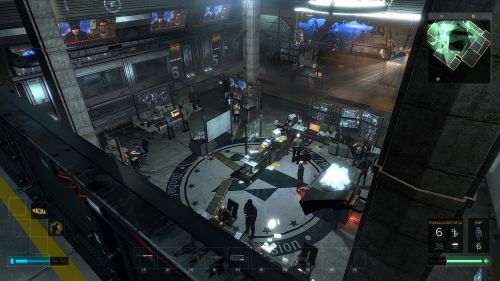
Your base of operations: note the greater object/actor density and draw distance than was typically seen in Human Revolution.
Mission design
The original Deus Ex was not so much an 'open world' game, but a 'big level game': the huge and naturalistically designed levels (e.g. the supertanker, Vanderberg AFB, etc.) gave you the impression you really were infiltrating a real environment that you could circumnavigate and probe rather than a designer-created corridor through it, and the sense of achievement on succeeding and the breadth of potential routes and approaches were welcome dividends. Only the Thief series has ever matched it, and Human Revolution generally fell short.
One of the dividends of increasing technology is the mission environments in Mankind Divided have generally gotten bigger, and so they more closely approach the near-perfection of the original Deus Ex. Pallisade Bank is perhaps the best example: huge, multi-level with executive offices, lobby, vaults, connected with a labyrinth of hidden and not-so-hidden passages with lots of points of entry and egress, and similarly lots of things to uncover and find (it also benefits synergistically from being an interesting concept: a data-bank and vault for information that generally lies beyond national jurisdiction). Generally the median level of Mankind Divided approaches the most 'open' levels of Human Revolution (e.g. Hengsha Docks, Court gardens), and this move in mission design is to be warmly welcomed, although the continued reliance on air-ducts and ventilation systems for many of these alternative routes does give a blemish.
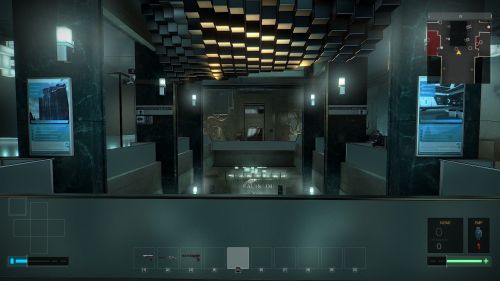

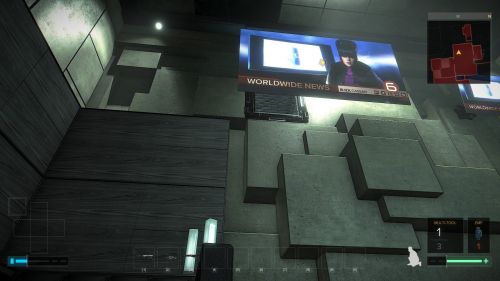
Pallisade bank: The screenshots can't adequately capture the cool undulating movement of the roof elements, not the complicated topography. One does wonder whether the real conspiracy is for whoever designed the ventilation systems in these top security facilities.
Mankind Divided has moved steadily more towards 'open world' principles too. Probably 70% or so of the game content is off the critical path, and a Codex Let's Player managed to finish the game in around 4 hours by ignoring it. They probably missed out: the 'side-quest' content is very good, covering a good mix of police procedural and espionage: a murder mystery plot is one highlight, the player's tracking down of a 'black market media' organization that threatens to blow cover of another group another, and piecing together the backstory behind a new, highly (but selectively) lethal recreational drug the same.
Consequence of choices, although not used as liberally as other games such as Alpha Protocol, is deployed well, outcomes through side quests can feed into one another and the main narrative. A particular strength is the impression the game gives of things being time-sensitive, and the willingness the designers have previously demonstrated to punish the player for tarrying too long push one out of the typical RPG comfort zone of assuming that things can wait whilst you toddle around to explore and hoover up unrelated side-quests. I vividly remember having to prioritize on the fly several objectives that might be time sensitive and racing to try and complete one 'in time' to complete the second: I suspect for many of these there was no actual time limit (the nagging infolink messages you get from NPCs to meet you at the helipad etc. do not seem to amount to much, for example), but the illusion was compelling enough to drive interesting play.
Gameplay
The gameplay is broadly an evolution of what was there in Human Revolution, although most of the serious problems in this game remain in the sequel.
There remains a shooting option, although the gunplay is so-so and generally means one misses the best the game has to offer (the guns seem slightly better balanced such that Human Revolution's armour-piercing pistol no longer reigns supreme over the long-arms in the game, although on harder difficulties most of your guns lack punch). They've also renovated the upgrade system, where you pick up a pool of crafting components which you can use to increase damage, ammo capacity, etc, as well as particular add-ons that can be used for certain weapons (e.g. silencers, scopes, etc). That you can swap the latter in-and-out on the fly is pretty nifty.
The center of gravity of the game remains stealth: sneaking into (or out of) some well-guarded facility, picking up information along the way, with a dash of dialogue and hacking minigames. Stealth play has gotten slightly better, although the necessary conceits still tax suspension of disbelief (guards don't notice their patrol mate is no longer doing their rounds despite environmental chatter about patrols 'calling in', cameras on swivels allowing canny players to move around them, and so forth). It is almost better thought of as a puzzle game, and the slightly more deterministic options of stealth movement (e.g. when in cover you get a breadcrumb trail along your field of view to seamlessly move into another piece of cover) probably help in that end, likewise the warning indicators that you are in view of a camera or guard so they might move to 'suspicious' or 'alerted'.
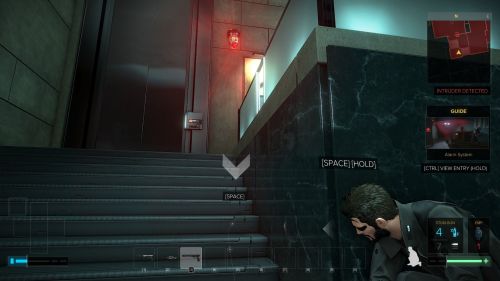
The stealth movement allows you to move around a corner by holding space, or to move to your cursor by tapping space. The minimap will also display whether you've been detected (as here), and then will show a search timer before things go back to (somewhat) normal. Another useful feature is the red sections of minimap indicate 'restricted areas' where you should not not be, whilst non-red sections can be walked around freely.
Developing AI for this remains challenging, and Mankind Divided does not make great strides: the path of least resistance remains knocking out all the guards you come across on your way through; your steadily regenerating takedown button of awesome remains overpowered, as the vast majority of enemies in the game are susceptible to your sucker punches; and the predictable behaviour a little too easy to exploit: one of my go-to strategies was crouching behind cover, deliberately exposing myself to a guard so he would obligingly walk over to investigate, then promptly awesome-buttoning him out of the fight (admittedly, the new 'knockout from cover' animations are pretty neat).
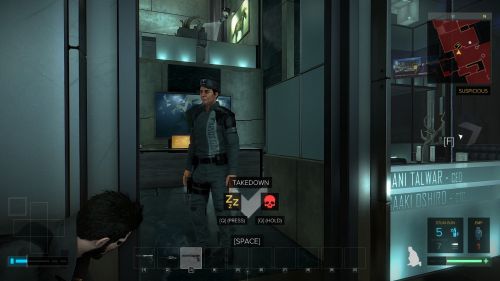
Guards can become suspicious to environmental triggers (good). However, they blithely walk over to the source of the disturbance, allowing a silent takedown (less good).
The common hacking minigame has gotten a boost in both depth and difficulty (in the original, maxed out stealth hacking generally assured an easy win over all devices difficulty 3 and below, which gave you enough hacking boosters to blow through the harder difficulty ones), but unfortunately the added wrinkles are not enough to make the minigame - admittedly better than most offerings - interesting enough to hold your attention for the very large number of times you are inclined to use it.
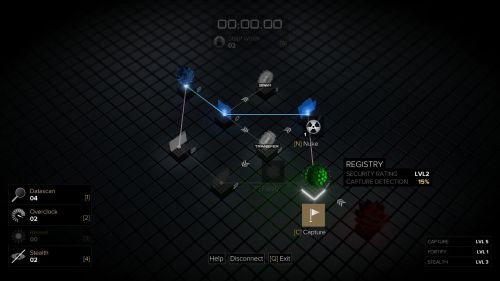
Hacking: note the 5 (instead of 2) hacking powerups. There are also further traps - some hacking games have a 'fog of war' so you can only see adjacent nodes, and some connections have a firewall that prompts an alert. Both have counters.
One of the triumphs of Human Revolution was the 'dialogue battle' system, where you tried to choose the best option out of semi-randomized dialogue paths, given what you knew of an NPC, to persuade them or win the argument. There are some good developments: in Human Revolution, if the 'rational' response was effective, hitting that option for each interaction in the conversation would usually mean you win; in Mankind Divided, you often have to switch from one approach to another. It is also good that you now have conversation options over instant messenger when you log in to particular computers. Sadly, the decline is greater: it remains the case that the social aug makes the dialogue battles both too easy and less interesting. This problem is exacerbated by collapsing the dialogue battles into the social aug mechanics: instead of trying to guess from the personality analysis which approach will work, you can simply count the number of times alpha, beta, or omega pings during the dialogue, and then choose the option that pinged the most times to win.
The augs generally get a tune-up, and the several new ones you get (e.g. Titan armour, Tesla, the Icarus dash) are pretty cool to use. There are, however, three problems. First, the balance is all over the place: some augs seem pretty useless (e.g. Mark-and-Track, which seems strictly inferior to your minimap radar, especially when upgraded), whilst others can trivialize many encounters: the remote hacking aug lets you disable cameras, turrets, robots, and tripwires safely, and no enemies seem to have a counter to your stealth aug, letting you either carefully disable the security piecemeal, or, if you're in a rush, just chomp biocells and run to the objective stealthed with impunity. Second, you progress too quickly: the game seems more generous with experience, such that hacking or exploration augs often 'pay for themselves' with the XP you get, such that at the half-way mark you have all the augs you need at the ranks you need them, and subsequent points are deployed as pleasing filler. Third you generally end up considerably overpowered, especially if you follow the game's implied suggestion to explore and hoover up all the loot in the open world: at the same half-way point I had all the augs I wanted, I had dozens of biocells, hypostims, a perpetual float of 100 rounds of ammo for my less-lethal weapons (for which most enemies only needed one shot to incapacitate), and fully tricked out lethal weapons as a contingency.

The somewhat broken remote hack aug - when fully upgraded, disabling a camera for 30 seconds is but a short minigame away.

My augs at around the half-way mark. Note the number of green (fully upgraded) ones.
Nonetheless, there are moments where the gameplay and mission elements combine to make an experience far greater than the sum of its parts. My favourite is near the end where you are trying to act as convention security, which rapidly spirals out of control and continues a crescendo of impeding diaster as you find out more and more about what your adversaries have planned and how close their plans are to fruition, involving sections of carefully weaving your way through a packed convention to hunt down the bad actors and a mad dash at the close as everything blows up in your face.
I never asked for this
Perhaps the most noteworthy innovation in Mankind Divided is in the field of avarice. Much of the utterly rubbish microtransaction and monetization typically in the ambit of low-rent mobile games come out in force. There's the wholly indefensible shop where you can pay real money to buy Praxis kits for your character, the entirely unnecessary and tacked on breach mode with semi-randomized rewards and microtransactions galore, the stupid mobile app integration, and the pre-order and extra item DLCs. These are all mercifully unnecessary and can be ignored during the course of the game, but they represent the early signs of metastasis of pay-to-win and monetization to single player games where they were heretofore mercifully absent. Would that the radioactive criticism the developers have received from all quarters put this cancerous development firmly in remission.
Look, sound, and feel
The portrayal of 'augmentation apartheid' has come in for some stick in the press for its arrogation of previous racist episodes in human history (there's a Rosa Parks-esque sequence that follows if you get in the 'non-Aug' section of the metro, for example). Much of this relies on a misguided reification of western racism: that it forms some platonic ideal of evil to which any work that refers to it inevitably debases. Although Mankind Divided's efforts here are far less subtle and less assured than elsewhere (the 'Aug lives matter' attempt to co-opt ongoing racial tension in the US particularly ill-advised), it does nonetheless persuasively evoke a world riven with prejudice and strife: vendors refuse to serve you, bystanders abuse you, police hassle you, and the 'Aug ghetto' you live in is tonally different from the more upmarket areas of Prague.
The developers have justly become more confident in their visual stylings, and there is plenty to praise about how the game looks (even though the graphical enhancements and level sizes are sufficient to bring most computers to their knees). Prague neatly juxtaposes old world charm with the erupting technology, Koller's shop hits a sweet spot of being a haven of erudition whilst being disquietingly ghoulish, and Golem City (the Aug internment camp) looks like it was torn straight out of some extremely good sci-fi concept art and is truly breath-taking. Although not all the environments reach the same heights, all have meticulous attention to detail and are far from the sterile commonplaces one often sees in other games. The 'piss filter' of the first game is nowhere to be found, and the general loss of the cyber-renaissance style perhaps regrettable, but profoundly thematically appropriate given the more 'dark ages'-like setting of the game. The sound, although not as strikingly good as the visuals, is effective, and usually complements well the generally uneasy and on edge feel across the entire game.
The writers make the most of the high quality environments in their story-telling. A meeting you hold with your contact in a now dilapidated and desolate limb clinic is a neat example of reinforcing the theme of augmented dreams crushed (a shame the writers, insufficiently confident of the environmental message, lampshade it slightly too much in the dialogue). Weather and environmental effects are used judiciously to reflect the deteriorating situation in Prague. Hard to access apartments imply that others might be investigating you, fostering a growing paranoia of who you can trust and whether you are already several steps behind your adversaries. The email correspondence has a realistic amount of noise with some tantalizing signals that both flesh out some of the characters and foreshadow some developments that eventually arise in Deus Ex itself.
Narrative and characterization
Eidos Montreal is unusual for giving an executive position to the head writer/'narrative director' in developing the game. The priority story has is well placed, as the story is broadly excellent throughout. Alas it also bears a brace of Achilles's heels.
One of the fun of seeing a prequel is the 'before they were famous' insight into individuals and groups you know will come to prominence in Deus Ex, and Mankind Divided does more of the same, with some tongue in cheek 'easter-egg' foreshadowing thrown in. The flip side is you know how this story has to ultimately turn out, and so adversaries who you know are dramatis personae in Deus Ex you also know aren't going to be ultimately beaten. This need not be a bad thing: the writers may well have the touch and courage to write a story where our plucky hero ultimately does not win the day. Here's hoping.
The underlying narrative driving both the plot and the character choices within it is solid stuff, so much so the writers can use apparent lapses of continuity to signify missing links in the player's understanding, rather than errors on the part of the writing team. I remember being caught virtually red-handed by another NPC, who nonetheless didn't seem to do anything about it, and I was wracking my brains to work out why - only for a satisfying explanation in the narrative's underlying logic to arise later. During the game the narrative judiciously teases you (up to a point, see below) with potential loose ends letting you speculate on what characters may or may not be up to off-screen, and the game deftly manages to throw enough dubiously damning and equivocally exonerating information to keep you in doubt about whether certain colleagues have a hidden agenda or not.
'Screen time' is distributed widely among a large cast of characters, leaving perhaps too little opportunities of development. They nonetheless make interesting or intriguing cameos - you think through your boss's choice of words to see whether you should suspect him or not, you generally warm to Alex, and you keep wondering what Janus is really up to. McCreedy and Chikane are a bit weaker: cut from a similar cloth of, 'generally moody about the player due to their augments but - in true bioware style - open up a bit later with exculpatory backstory if you press them'. Lots of the smaller parts are well played too: Daria, the eccentric witness; K, a demagogue; and a nameless cop you hear rationalize her brutality are among the highlights. The use of environmental elements often helps in adding depth outside of their generally short screen-time: some of the email traffic you can view fleshes out Rucker as a conciliatory, well meaning, but perhaps ineffectual and vainglorious leader; likewise you can get a bit more information about your main antagonist when you get to raid his office, although he still remains a little underdeveloped (and you regrettably can tag him almost immediately as an adversary by the application of the 'bad guys look ugly' trope).
The central problem, unfortunately, resides in the central character you play. It seems challenging to reconcile Jensen's pivotal role in the events of the first game with his current job as an undercover agent: at least some of the well-connected should know who he is and be much more on guard, and it seems wiser on the face of it for Jensen to stay off the radar rather than brazenly signing on for interpol. A bigger problem is that Jensen is caught in no-mans land between being a tabula rasa for player choice or to be a character with his own drives that propel the narrative. On the one hand, Jensen's actions are often taken out of the hands of the player, and often where the player would want to act differently: I particularly took exception to Jensen openly accusing a character of betrayal where I'd far rather he keep his suspicions to himself. As a consequence, the choices you can make to be critical or sympathetic or something else in dialogue are dislocated from the main thrust of his behaviour through which you have no control. On the other, Jensen is pretty weakly characterized (following the tradition of Deus Ex protagonists) and most of the opportunities to develop his character regarding his Ex, his relationship with Sarif, his allegiances in the wider world have already been taken, leaving precious few seams left to mine for further development.
Where's the rest of it?
Human Revolution, for all its strengths, had a pretty ropey ending. Mankind Divided avoids this risk by committing the even worse narrative sin of simply not writing one. It tees up all manner of intriguing developments: allegiances of several main characters, the development of several more bit parts, ongoing revelations about what happened to your character post-Panchea, who may be watching you (and why), and who your adversaries truly are. Yet, with very few exceptions (one revealed mid-credits), you never find these things out. It is akin to playing the original Deux Ex if the game stopped at the point you escaped UNATCO.
The player generally expects plot arcs to have a resolution, and for characters to develop during the course of the story: subverting these expectations in the narrative can work well, and can be a fop to verisimilitude: in real life, people's characters do not always develop in step with some grander narrative, and you don't always get all the answers. Do it too much, though, and the player suspects you are not even trying (or, worse, hope to spin things out for sequels and DLC). Mankind Divided falls into the latter category. It is actually slightly worse than a hypothetical Deus Ex that stopped after UNATCO: at least in that you have learned something. In Mankind Divided, although you solve the initial case, the bulk of the narrative interest is in the underlying actions of the players 'behind the scenes', and this plot merely treads water: Adam Jensen (and you) haven't really learned anything about the world that you didn't already know at the start.
Conclusion: Not enough steps forward, a few steps back
Mankind Divided is so near and yet so far. Its elements mostly build upon the strong foundations of Human Revolution, but occasionally they retreat back from earlier triumphs, and leave some major flaws uncorrected. It is cleverly written but with a few too many mis-steps, and a central lacuna around the player character himself. At its best, the strengths of the game combine harmoniously to produce one of the best opening thirds in computer gaming; the fatal weakness is that it is no more than an opening third, and the game ends on a deeply imperfect cadence with too many themes undeveloped, leave alone resolved.
The game indicates considerable talent, and the writing team know their craft well. My hope is that the impressive story Mankind Divided intimates has been mostly written, and that subsequent additions to the franchise will adroitly fulfill the undoubted promise manifest here. Yet these games do not yet exist, and thus Mankind Divided remains a promissory note for a series of games which in combination may form a masterpiece. Unless and until that happens, this opening act, despite its qualities, cannot justify its own purchase.
Mankind Divided is the 'sequel to the prequel', following Adam Jensen after the climax of Human Revolution. Human Revolution was a clever, well-constructed, and worthy sequel to the original Deus Ex - if not quite surpassing it. Is Mankind Divided a further step in the right direction?
Note: as I want to discuss and critique the game, this review will contain some mild spoilers for Mankind Divided (of a similar degree to what you'd get watching some of the trailers and teaser videos released by the developer), and more serious spoilers of Human Revolution and Deus Ex itself. One can scroll to the final heading to see a (wholly spoiler-free) summing up and recommendation whether or not one should buy the game.
Introduction
The game opens with bravura.
You are again Adam Jensen, now two years post Panchea, and on your own quest to expose the Illuminati, you now work as a double-agent: on the one hand you are an agent for TF29, Interpol's counter-terrorist organization; on the other, you are investigating TF29 on behalf of the mysterious Juggernaut Collective, headed by the mysterious hacker Janus. For TF29, your direct boss is Miller; for JC (I doubt a coincidence), your handler is Vega.
Since 'the Incident', Hugh Darrow's haywire protocol for all people with augmentations worldwide, causing many to enter into a violent frenzy, tensions have been running high between 'naturals', those without augmentations, and augmented people. You spend most of your time in Prague, previously an economic powerhouse and haven for the augmented, now deeply divided and restive with tensions close to boiling over. Worldwide, the UN is contemplating a 'Human Restoration Act' anti-Aug measure. After an operation in Dubai, you go to Prague, and a terrorist attack on your arrival propels you into action.
This is a clever set up, and ripe for the 'conspiracies within conspiracies' that Deus Ex thrives upon. Although you are investigating things on behalf of TF29, you are also investigating TF29 itself - and trying to make sure TF29 doesn’t start investigating you, too.

Your base of operations: note the greater object/actor density and draw distance than was typically seen in Human Revolution.
The original Deus Ex was not so much an 'open world' game, but a 'big level game': the huge and naturalistically designed levels (e.g. the supertanker, Vanderberg AFB, etc.) gave you the impression you really were infiltrating a real environment that you could circumnavigate and probe rather than a designer-created corridor through it, and the sense of achievement on succeeding and the breadth of potential routes and approaches were welcome dividends. Only the Thief series has ever matched it, and Human Revolution generally fell short.
One of the dividends of increasing technology is the mission environments in Mankind Divided have generally gotten bigger, and so they more closely approach the near-perfection of the original Deus Ex. Pallisade Bank is perhaps the best example: huge, multi-level with executive offices, lobby, vaults, connected with a labyrinth of hidden and not-so-hidden passages with lots of points of entry and egress, and similarly lots of things to uncover and find (it also benefits synergistically from being an interesting concept: a data-bank and vault for information that generally lies beyond national jurisdiction). Generally the median level of Mankind Divided approaches the most 'open' levels of Human Revolution (e.g. Hengsha Docks, Court gardens), and this move in mission design is to be warmly welcomed, although the continued reliance on air-ducts and ventilation systems for many of these alternative routes does give a blemish.



Pallisade bank: The screenshots can't adequately capture the cool undulating movement of the roof elements, not the complicated topography. One does wonder whether the real conspiracy is for whoever designed the ventilation systems in these top security facilities.
Consequence of choices, although not used as liberally as other games such as Alpha Protocol, is deployed well, outcomes through side quests can feed into one another and the main narrative. A particular strength is the impression the game gives of things being time-sensitive, and the willingness the designers have previously demonstrated to punish the player for tarrying too long push one out of the typical RPG comfort zone of assuming that things can wait whilst you toddle around to explore and hoover up unrelated side-quests. I vividly remember having to prioritize on the fly several objectives that might be time sensitive and racing to try and complete one 'in time' to complete the second: I suspect for many of these there was no actual time limit (the nagging infolink messages you get from NPCs to meet you at the helipad etc. do not seem to amount to much, for example), but the illusion was compelling enough to drive interesting play.
Gameplay
The gameplay is broadly an evolution of what was there in Human Revolution, although most of the serious problems in this game remain in the sequel.
There remains a shooting option, although the gunplay is so-so and generally means one misses the best the game has to offer (the guns seem slightly better balanced such that Human Revolution's armour-piercing pistol no longer reigns supreme over the long-arms in the game, although on harder difficulties most of your guns lack punch). They've also renovated the upgrade system, where you pick up a pool of crafting components which you can use to increase damage, ammo capacity, etc, as well as particular add-ons that can be used for certain weapons (e.g. silencers, scopes, etc). That you can swap the latter in-and-out on the fly is pretty nifty.
The center of gravity of the game remains stealth: sneaking into (or out of) some well-guarded facility, picking up information along the way, with a dash of dialogue and hacking minigames. Stealth play has gotten slightly better, although the necessary conceits still tax suspension of disbelief (guards don't notice their patrol mate is no longer doing their rounds despite environmental chatter about patrols 'calling in', cameras on swivels allowing canny players to move around them, and so forth). It is almost better thought of as a puzzle game, and the slightly more deterministic options of stealth movement (e.g. when in cover you get a breadcrumb trail along your field of view to seamlessly move into another piece of cover) probably help in that end, likewise the warning indicators that you are in view of a camera or guard so they might move to 'suspicious' or 'alerted'.

The stealth movement allows you to move around a corner by holding space, or to move to your cursor by tapping space. The minimap will also display whether you've been detected (as here), and then will show a search timer before things go back to (somewhat) normal. Another useful feature is the red sections of minimap indicate 'restricted areas' where you should not not be, whilst non-red sections can be walked around freely.
Developing AI for this remains challenging, and Mankind Divided does not make great strides: the path of least resistance remains knocking out all the guards you come across on your way through; your steadily regenerating takedown button of awesome remains overpowered, as the vast majority of enemies in the game are susceptible to your sucker punches; and the predictable behaviour a little too easy to exploit: one of my go-to strategies was crouching behind cover, deliberately exposing myself to a guard so he would obligingly walk over to investigate, then promptly awesome-buttoning him out of the fight (admittedly, the new 'knockout from cover' animations are pretty neat).

Guards can become suspicious to environmental triggers (good). However, they blithely walk over to the source of the disturbance, allowing a silent takedown (less good).
The common hacking minigame has gotten a boost in both depth and difficulty (in the original, maxed out stealth hacking generally assured an easy win over all devices difficulty 3 and below, which gave you enough hacking boosters to blow through the harder difficulty ones), but unfortunately the added wrinkles are not enough to make the minigame - admittedly better than most offerings - interesting enough to hold your attention for the very large number of times you are inclined to use it.

Hacking: note the 5 (instead of 2) hacking powerups. There are also further traps - some hacking games have a 'fog of war' so you can only see adjacent nodes, and some connections have a firewall that prompts an alert. Both have counters.
One of the triumphs of Human Revolution was the 'dialogue battle' system, where you tried to choose the best option out of semi-randomized dialogue paths, given what you knew of an NPC, to persuade them or win the argument. There are some good developments: in Human Revolution, if the 'rational' response was effective, hitting that option for each interaction in the conversation would usually mean you win; in Mankind Divided, you often have to switch from one approach to another. It is also good that you now have conversation options over instant messenger when you log in to particular computers. Sadly, the decline is greater: it remains the case that the social aug makes the dialogue battles both too easy and less interesting. This problem is exacerbated by collapsing the dialogue battles into the social aug mechanics: instead of trying to guess from the personality analysis which approach will work, you can simply count the number of times alpha, beta, or omega pings during the dialogue, and then choose the option that pinged the most times to win.
The augs generally get a tune-up, and the several new ones you get (e.g. Titan armour, Tesla, the Icarus dash) are pretty cool to use. There are, however, three problems. First, the balance is all over the place: some augs seem pretty useless (e.g. Mark-and-Track, which seems strictly inferior to your minimap radar, especially when upgraded), whilst others can trivialize many encounters: the remote hacking aug lets you disable cameras, turrets, robots, and tripwires safely, and no enemies seem to have a counter to your stealth aug, letting you either carefully disable the security piecemeal, or, if you're in a rush, just chomp biocells and run to the objective stealthed with impunity. Second, you progress too quickly: the game seems more generous with experience, such that hacking or exploration augs often 'pay for themselves' with the XP you get, such that at the half-way mark you have all the augs you need at the ranks you need them, and subsequent points are deployed as pleasing filler. Third you generally end up considerably overpowered, especially if you follow the game's implied suggestion to explore and hoover up all the loot in the open world: at the same half-way point I had all the augs I wanted, I had dozens of biocells, hypostims, a perpetual float of 100 rounds of ammo for my less-lethal weapons (for which most enemies only needed one shot to incapacitate), and fully tricked out lethal weapons as a contingency.

The somewhat broken remote hack aug - when fully upgraded, disabling a camera for 30 seconds is but a short minigame away.

My augs at around the half-way mark. Note the number of green (fully upgraded) ones.
Nonetheless, there are moments where the gameplay and mission elements combine to make an experience far greater than the sum of its parts. My favourite is near the end where you are trying to act as convention security, which rapidly spirals out of control and continues a crescendo of impeding diaster as you find out more and more about what your adversaries have planned and how close their plans are to fruition, involving sections of carefully weaving your way through a packed convention to hunt down the bad actors and a mad dash at the close as everything blows up in your face.
I never asked for this
Perhaps the most noteworthy innovation in Mankind Divided is in the field of avarice. Much of the utterly rubbish microtransaction and monetization typically in the ambit of low-rent mobile games come out in force. There's the wholly indefensible shop where you can pay real money to buy Praxis kits for your character, the entirely unnecessary and tacked on breach mode with semi-randomized rewards and microtransactions galore, the stupid mobile app integration, and the pre-order and extra item DLCs. These are all mercifully unnecessary and can be ignored during the course of the game, but they represent the early signs of metastasis of pay-to-win and monetization to single player games where they were heretofore mercifully absent. Would that the radioactive criticism the developers have received from all quarters put this cancerous development firmly in remission.
Look, sound, and feel
The portrayal of 'augmentation apartheid' has come in for some stick in the press for its arrogation of previous racist episodes in human history (there's a Rosa Parks-esque sequence that follows if you get in the 'non-Aug' section of the metro, for example). Much of this relies on a misguided reification of western racism: that it forms some platonic ideal of evil to which any work that refers to it inevitably debases. Although Mankind Divided's efforts here are far less subtle and less assured than elsewhere (the 'Aug lives matter' attempt to co-opt ongoing racial tension in the US particularly ill-advised), it does nonetheless persuasively evoke a world riven with prejudice and strife: vendors refuse to serve you, bystanders abuse you, police hassle you, and the 'Aug ghetto' you live in is tonally different from the more upmarket areas of Prague.
The developers have justly become more confident in their visual stylings, and there is plenty to praise about how the game looks (even though the graphical enhancements and level sizes are sufficient to bring most computers to their knees). Prague neatly juxtaposes old world charm with the erupting technology, Koller's shop hits a sweet spot of being a haven of erudition whilst being disquietingly ghoulish, and Golem City (the Aug internment camp) looks like it was torn straight out of some extremely good sci-fi concept art and is truly breath-taking. Although not all the environments reach the same heights, all have meticulous attention to detail and are far from the sterile commonplaces one often sees in other games. The 'piss filter' of the first game is nowhere to be found, and the general loss of the cyber-renaissance style perhaps regrettable, but profoundly thematically appropriate given the more 'dark ages'-like setting of the game. The sound, although not as strikingly good as the visuals, is effective, and usually complements well the generally uneasy and on edge feel across the entire game.
The writers make the most of the high quality environments in their story-telling. A meeting you hold with your contact in a now dilapidated and desolate limb clinic is a neat example of reinforcing the theme of augmented dreams crushed (a shame the writers, insufficiently confident of the environmental message, lampshade it slightly too much in the dialogue). Weather and environmental effects are used judiciously to reflect the deteriorating situation in Prague. Hard to access apartments imply that others might be investigating you, fostering a growing paranoia of who you can trust and whether you are already several steps behind your adversaries. The email correspondence has a realistic amount of noise with some tantalizing signals that both flesh out some of the characters and foreshadow some developments that eventually arise in Deus Ex itself.
Narrative and characterization
Eidos Montreal is unusual for giving an executive position to the head writer/'narrative director' in developing the game. The priority story has is well placed, as the story is broadly excellent throughout. Alas it also bears a brace of Achilles's heels.
One of the fun of seeing a prequel is the 'before they were famous' insight into individuals and groups you know will come to prominence in Deus Ex, and Mankind Divided does more of the same, with some tongue in cheek 'easter-egg' foreshadowing thrown in. The flip side is you know how this story has to ultimately turn out, and so adversaries who you know are dramatis personae in Deus Ex you also know aren't going to be ultimately beaten. This need not be a bad thing: the writers may well have the touch and courage to write a story where our plucky hero ultimately does not win the day. Here's hoping.
The underlying narrative driving both the plot and the character choices within it is solid stuff, so much so the writers can use apparent lapses of continuity to signify missing links in the player's understanding, rather than errors on the part of the writing team. I remember being caught virtually red-handed by another NPC, who nonetheless didn't seem to do anything about it, and I was wracking my brains to work out why - only for a satisfying explanation in the narrative's underlying logic to arise later. During the game the narrative judiciously teases you (up to a point, see below) with potential loose ends letting you speculate on what characters may or may not be up to off-screen, and the game deftly manages to throw enough dubiously damning and equivocally exonerating information to keep you in doubt about whether certain colleagues have a hidden agenda or not.
'Screen time' is distributed widely among a large cast of characters, leaving perhaps too little opportunities of development. They nonetheless make interesting or intriguing cameos - you think through your boss's choice of words to see whether you should suspect him or not, you generally warm to Alex, and you keep wondering what Janus is really up to. McCreedy and Chikane are a bit weaker: cut from a similar cloth of, 'generally moody about the player due to their augments but - in true bioware style - open up a bit later with exculpatory backstory if you press them'. Lots of the smaller parts are well played too: Daria, the eccentric witness; K, a demagogue; and a nameless cop you hear rationalize her brutality are among the highlights. The use of environmental elements often helps in adding depth outside of their generally short screen-time: some of the email traffic you can view fleshes out Rucker as a conciliatory, well meaning, but perhaps ineffectual and vainglorious leader; likewise you can get a bit more information about your main antagonist when you get to raid his office, although he still remains a little underdeveloped (and you regrettably can tag him almost immediately as an adversary by the application of the 'bad guys look ugly' trope).
The central problem, unfortunately, resides in the central character you play. It seems challenging to reconcile Jensen's pivotal role in the events of the first game with his current job as an undercover agent: at least some of the well-connected should know who he is and be much more on guard, and it seems wiser on the face of it for Jensen to stay off the radar rather than brazenly signing on for interpol. A bigger problem is that Jensen is caught in no-mans land between being a tabula rasa for player choice or to be a character with his own drives that propel the narrative. On the one hand, Jensen's actions are often taken out of the hands of the player, and often where the player would want to act differently: I particularly took exception to Jensen openly accusing a character of betrayal where I'd far rather he keep his suspicions to himself. As a consequence, the choices you can make to be critical or sympathetic or something else in dialogue are dislocated from the main thrust of his behaviour through which you have no control. On the other, Jensen is pretty weakly characterized (following the tradition of Deus Ex protagonists) and most of the opportunities to develop his character regarding his Ex, his relationship with Sarif, his allegiances in the wider world have already been taken, leaving precious few seams left to mine for further development.
Where's the rest of it?
Human Revolution, for all its strengths, had a pretty ropey ending. Mankind Divided avoids this risk by committing the even worse narrative sin of simply not writing one. It tees up all manner of intriguing developments: allegiances of several main characters, the development of several more bit parts, ongoing revelations about what happened to your character post-Panchea, who may be watching you (and why), and who your adversaries truly are. Yet, with very few exceptions (one revealed mid-credits), you never find these things out. It is akin to playing the original Deux Ex if the game stopped at the point you escaped UNATCO.
The player generally expects plot arcs to have a resolution, and for characters to develop during the course of the story: subverting these expectations in the narrative can work well, and can be a fop to verisimilitude: in real life, people's characters do not always develop in step with some grander narrative, and you don't always get all the answers. Do it too much, though, and the player suspects you are not even trying (or, worse, hope to spin things out for sequels and DLC). Mankind Divided falls into the latter category. It is actually slightly worse than a hypothetical Deus Ex that stopped after UNATCO: at least in that you have learned something. In Mankind Divided, although you solve the initial case, the bulk of the narrative interest is in the underlying actions of the players 'behind the scenes', and this plot merely treads water: Adam Jensen (and you) haven't really learned anything about the world that you didn't already know at the start.
Conclusion: Not enough steps forward, a few steps back
Mankind Divided is so near and yet so far. Its elements mostly build upon the strong foundations of Human Revolution, but occasionally they retreat back from earlier triumphs, and leave some major flaws uncorrected. It is cleverly written but with a few too many mis-steps, and a central lacuna around the player character himself. At its best, the strengths of the game combine harmoniously to produce one of the best opening thirds in computer gaming; the fatal weakness is that it is no more than an opening third, and the game ends on a deeply imperfect cadence with too many themes undeveloped, leave alone resolved.
The game indicates considerable talent, and the writing team know their craft well. My hope is that the impressive story Mankind Divided intimates has been mostly written, and that subsequent additions to the franchise will adroitly fulfill the undoubted promise manifest here. Yet these games do not yet exist, and thus Mankind Divided remains a promissory note for a series of games which in combination may form a masterpiece. Unless and until that happens, this opening act, despite its qualities, cannot justify its own purchase.
There are 30 comments on RPG Codex Review: Deus Ex: Mankind Divided





